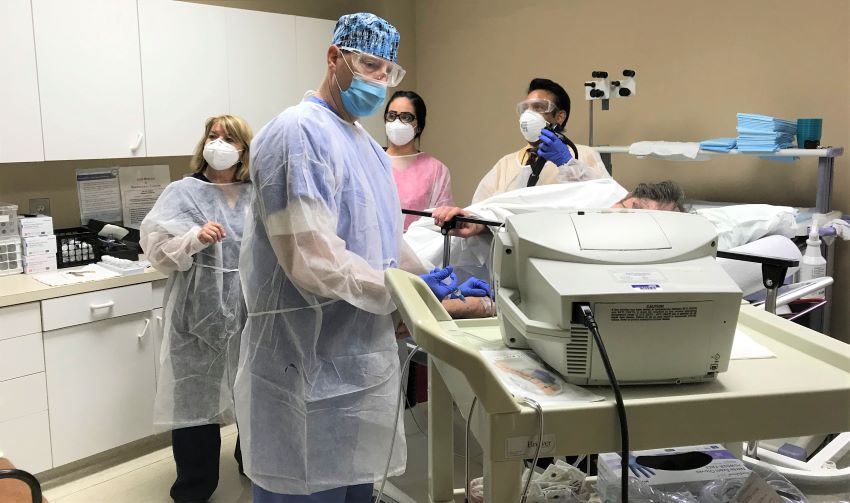In this first of a five-part series, noted Atlanta gastroenterologist and Emory School of Medicine professor, INDRAN INDRAKRISHNAN, MD* answers questions related to COVID-19.
Cover photo: Dr. Indrakrishnan and his team at work.
———————————————————–
Are there medications to cure COVID-19 infection?
Back in the day, when I was in training, medical breakthroughs were announced by renowned scientists in peer-reviewed, acclaimed medical journals. Now, this has been taken over by politicians and social media! And there lies all the confusion and negativity.
So far, only Remdesivir, an intravenous drug, has been approved by FDA for hospitalized Covid-19 patients to shorten recovery time. A VA study recently concluded that Hydroxychloroquine was in fact harmful when given to hospitalized patients. This finding is not surprising as severe Covid-19 infection (i.e. in hospitalized patients) has direct deleterious effects on the heart, with significant rhythm disturbances and miroembolic phenomenon causing fatal heart attacks on patients hitherto not known to have heart diseases.
Similarly, Hydroxychloroquine also has its own direct cardiac toxicity with rhythm abnormalities (QT Prolongation and Torsade de pointes) and when given to severely ill patients with overwhelming infection, may backfire and end up causing fatal heart attacks.
No drugs have been shown to be effective in prophylaxis (action taken to prevent disease) for outpatient treatment in proper randomized double-blind studies. However, Hydroxychloroquine for healthy people as a covid-19 prophylaxis is a totally different subject. At least three studies in the USA and few more around the world are being conducted to evaluate the effectiveness of Hydroxychloroquine as prophylaxis in contact subjects.
Dr. Jon Giles, the principal researcher of this study at Columbia University didn’t expect to have any problems in enrolling subjects for his clinical trial to test whether hydroxychloroquine can help prevent covid-19. There was plenty of enthusiasm at the beginning, but with the worldwide negative publicity on this drug, he has a hard time now in finding people to continue this study!
Hopefully having learned a lesson, politicians will cease interfering with healthcare development in the future.
A randomized double-blind study mainly done in Canada and published in New England Journal of Medicine this week showed that Hydroxychloroquine may be marginally effective as a prophylactic drug in post-exposure healthy contact subjects, but it was not statistically significant. Of interest, no serious side effects were observed in people who received the actual drug. Even though this study did not show any significant benefit for post-exposure subjects for Covid-19, we still do not know whether Hydroxychloroquine will be effective in pre- exposure prophylaxis in high -risk population.
Duke Clinical research institute has an ongoing study (HERO) on the effectiveness of Hydroxychloroquine in high risk healthcare workers.
On a personal note, I am well aware that dozens, if not hundreds of front line physicians have been taking this drug as prophylaxis but they may be hesitant to disclose it due to the embarrassment of political exposure of this drug!
When will vaccines become available?
I am confident that at least one vaccine will be available by the end of the year, but the question is whether it is going to be effective in mounting an excellent immune response, particularly in the high-risk population with reduced immunity, and whether it will have a long-term safety profile.
The US has pledged to pay $1.2 billion to get early access to 300 million doses of an experimental covid-19 vaccine being developed and tested at the University of Oxford and licensed to drug maker AstraZeneca which made blockbuster drugs like Prilosec and Nexium. It is expected to be delivered in the fall and doses will be stored until the vaccine completes clinical trials ensuring it is safe and effective in protecting against covid-19 infection. If it isn’t, they’ll be discarded! There are many examples of preliminary vaccines being successful, but in large trials they’ve made infections worse. One example is a vaccine against a respiratory virus in 1960s where the vaccine subjects did worse. Similar fate was observed in one of the Ebola vaccines in 2018.
The other caveat is that the public generally has mixed feelings about vaccination. A recent survey by the Associated press and the NORC Center for Public Affairs research revealed that only 49% of Americans planned on taking the Covid-19 vaccine when it becomes available, while 31% said not sure and an alarming 20% said they would not get this vaccine at all! Herd immunity is successful only when 80% of the population is immune to the virus through infection and/or vaccination.
A federally mandated vaccination policy may be necessary to require all Americans, at least school children and workers in direct -contact work to be vaccinated against Covid -19 when this becomes available.
Do you recommend any immune boosters?
No specific agent has been scientifically shown to be effective in boosting immunity against Covid-19. There have been some suggestions that Vitamin-D, Vitamin -C, Vitamin B-2, zinc and turmeric may have some beneficial effects in mounting the immune response. Adequate sleep, regular exercise and less stress certainly help boost immunity.
Some studies suggest that gastrointestinal issues are an additional symptom of covid-19. What are these symptoms?
Covid-19 infection can affect almost any organ system in the body, first through the direct impact of its viremia and then through a complex harmful super immune response by the body to the virus.
The digestive system is also certainly a target for the virus and the symptoms include nausea, vomiting, loss of appetite, abdominal pains and diarrhea.
However, people hardly get deathly sick from digestive tract impact alone and they usually exhibit these symptoms alone at the beginning of the illness or with other typical respiratory symptoms. Some may not have any fever which is otherwise considered as a cardinal sign of covid-19 infection.
Patients may carry the virus in the stool for a longer time after an apparent recovery and hygienic precautions are important in preventing feco -oral transmission. Most of the patients respond to symptomatic treatment and no severe impact on the digestive system has been noted, but it is important to be aware of these symptoms for proper diagnosis of Covid-19 in case of atypical presentation. Health care workers and public should be cognizant of these facts in the management of the Covid-19 infection.
Q&A with Dr. Indrakrishnan will continue next week…

*Dr. Indran Indrakrishnan is a well-known Atlanta based gastroenterologist and clinical professor at the Emory University School of Medicine. In 2018, Dr Indrakrishnan became the first American of Indian descent to receive a commendation from former Georgia Governor Nathan Deal for his exceptional work in improving the lives of Georgians affected by colorectal cancer and other gastroenterological diseases.
The Georgia Senate passed a resolution in 2017 honoring Dr. Indrakrishnan’s service to Georgia. The Georgia House of Representatives followed suit with a resolution declaring February 14th 2018 as Dr Indrakrishnan day.
He was also named among the 25 Most Influential Asian Americans in Georgia twice- in 2016 & 2018.
Dr. Indrakrishnan is a former president and board member of the Georgia Gastroenterology and Endoscopic Society and currently sits on the Georgia Board of Healthcare Force, as well as the boards for Rainbow Village, Fight Colorectal Cancer, Meals by Grace and Hindu Temple of Atlanta. He is also past president of Georgia Association of Physicians of Indian Heritage (GAPI) and currently on the board of trustees.





